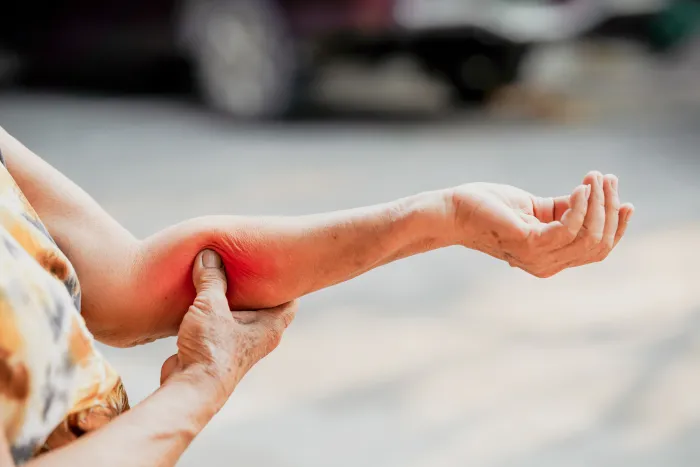Weakness and Aching Limbs? ESR Testing for Indian Grandmothers
This article explains why Indian grandmothers may experience weakness and aching limbs, and how the ESR test, a common diagnostic tool, can help pinpoint the cause.

Written by Dr. Dhankecha Mayank Dineshbhai
Reviewed by Dr. D Bhanu Prakash MBBS, AFIH, Advanced certificate in critical care medicine, Fellowship in critical care medicine
Last updated on 11th Aug, 2025

As women age, it’s common to experience tiredness, joint stiffness, and general body aches. While many grandmothers in India attribute these symptoms to “just getting old,” they may actually point to something deeper: chronic inflammation. A key tool to investigate this is the ESR test, short for Erythrocyte Sedimentation Rate. This simple blood test can reveal ongoing inflammation in the body and is often used as an arthritis blood test for seniors. It’s especially useful in diagnosing causes of weakness and aching limbs in elderly women, from arthritis to hidden infections. In this article, we explore how ESR testing helps Indian grandmothers better understand their symptoms, when to take the test, and how Apollo 24|7 makes it convenient to book this important diagnostic from home. Whether you are a concerned daughter, a family caregiver, or a senior woman seeking answers for persistent discomfort, this guide offers practical insight into ESR testing for elderly women.
What Is the ESR Test and Why Does It Matter?
The ESR (Erythrocyte Sedimentation Rate) test measures how quickly red blood cells settle at the bottom of a test tube in an hour. Normally, red cells settle slowly. But when there is inflammation in the body, certain proteins cause them to clump together and fall more quickly. This makes the ESR test a reliable early sign of inflammation, especially in elderly individuals who may not show obvious symptoms. It is not disease-specific but can alert your doctor that something is wrong, helping guide further investigation.
Why ESR Is Important for Elderly Women in India?
For Indian elderly women, complaints like:
- Constant fatigue
- Aching legs and arms
- Morning stiffness in joints
- Reduced ability to walk long distances
- Swelling around knees or wrists
These could be symptoms of autoimmune diseases, rheumatoid arthritis, polymyalgia rheumatica, or even hidden infections like tuberculosis, which can affect bones and joints. In such cases, an ESR test for elderly women is one of the first steps to assess if there’s inflammation causing these persistent symptoms.
Book ESR (Erythrocyte Sedimentation Rate) Test
How ESR Connects to Weakness, Aches, and Arthritis?
As women enter their 60s and 70s, hormonal changes, reduced mobility, and chronic conditions like osteoporosis or arthritis become common. Among them, rheumatoid arthritis (RA) and polymyalgia rheumatica (PMR) are conditions where inflammation attacks joints or muscles, leading to fatigue, pain, and stiffness.
Here’s how ESR becomes relevant:
- High ESR levels may indicate active inflammation linked to RA or PMR.
- ESR can be used to track the effectiveness of treatment, a falling ESR may show that inflammation is reducing.
- Combined with other tests (like CRP and Rheumatoid Factor), ESR helps build a complete picture of the elderly woman’s inflammatory status.
For example, a grandmother who feels tired, has aching shoulders and hips every morning, and struggles to lift her arms could be developing polymyalgia rheumatica. In such cases, an elevated ESR confirms that inflammation is present and needs further investigation.
When Should Elderly Women Take the ESR Test?
You might consider taking the ESR test if:
- You have persistent joint or muscle pain without injury.
- Your limbs feel heavy or tired, especially after light activities.
- You experience morning stiffness that lasts more than 30 minutes.
- There’s unexplained weight loss or low-grade fever.
- You have been diagnosed with arthritis and want to monitor disease activity.
- You have fatigue or body pain and want to rule out inflammatory causes.
- These are especially important for women over 60, who are at increased risk for chronic inflammatory and autoimmune diseases.
Book Apollo Arthritis Panel Basic
What to Expect During the ESR Test?
The ESR test is simple and minimally invasive. It involves:
- Drawing a small amount of blood from a vein, usually in the arm.
- No fasting is required.
- Results are usually available within 24 to 48 hours.
There is no discomfort beyond a small needle prick, and you can go back to your normal routine immediately.
How to Prepare for the Test?
There is no special preparation required before the ESR test. However, you should:
- Inform your doctor if you are taking blood-thinners, anti-inflammatory drugs, or have a known infection.
- Let the lab know if you are currently on steroids or treatment for arthritis, as these can influence your ESR levels.
- Be aware that ESR is a general marker, it does not tell you exactly where the inflammation is, but it helps indicate a deeper problem.
Book Apollo Senior Citizen Health Check Advance - Female
ESR in Combination With Other Tests
For Indian grandmothers who report long-standing weakness, joint pain, or reduced mobility, doctors often recommend the ESR test alongside:
- CRP (C-Reactive Protein): Another inflammation marker that changes faster than ESR.
- RA Factor: Specific marker for rheumatoid arthritis.
- Anti-CCP: Specific marker for rheumatoid arthritis.
- ANA Test: For autoimmune diseases like lupus.
- CBC (Complete Blood Count): To rule out anaemia or infection.
- Vitamin D & Calcium Tests: To assess bone health, which is essential in post-menopausal women.
Doing these together provides a comprehensive view of health, especially when symptoms are vague or scattered.
ESR and Chronic Conditions in Seniors
For elderly women with diagnosed conditions like:
- Rheumatoid Arthritis
- Polymyalgia Rheumatica
- Systemic Lupus Erythematosus (SLE)
- Chronic infections like TB or UTIs
- Cancer-related inflammation
The ESR test becomes a monitoring tool. Tracking ESR over time helps doctors evaluate if inflammation is increasing, stable, or responding to treatment.
Interpreting ESR Test Results
For most elderly women:
- Normal ESR range is typically:
- 0–30 mm/hr for women over 50
- However, values slightly above normal may still be fine depending on individual health
Elevated ESR could suggest:
- Autoimmune disease
- Chronic infection
- Cancer
- Kidney or liver issues
- Tissue damage or inflammation
- Low ESR values are usually not concerning unless combined with other symptoms.
Your doctor will interpret ESR results alongside your medical history, physical examination, and other test reports. ESR alone is not diagnostic but is extremely useful in identifying whether inflammation is active.
How Apollo 24|7 Simplifies ESR Testing for Seniors?
Apollo 24|7 makes it easy for Indian grandmothers to get the ESR test done without the stress of long clinic visits. With sample collection from home and digital reports, seniors can prioritise their health without hassle.
Here are some recommended tests for senior women on Apollo 24|7:
1. ESR (Erythrocyte Sedimentation Rate) Test: A standalone test that checks for general inflammation in the body.
2. Apollo Arthritis Panel Basic: Includes ESR, CRP, RA Factor, and Uric Acid—ideal for elderly women with joint pain.
3. Apollo Senior Citizen Health Check Advance - Female: Covers ESR, blood sugar, kidney function, thyroid, lipid profile and more. A well-rounded option for preventive care.
Get Your Health Assessed Here
Conclusion
Weakness, aching limbs, and slow movements in Indian grandmothers are not always just signs of ageing. Often, they are red flags for underlying inflammation. The ESR test for elderly women is a valuable tool to catch such issues early, whether it’s arthritis, polymyalgia, or chronic infection. If you or your mother or grandmother frequently complains of tiredness, stiffness, or unexplained pain, speak to a doctor and book an arthritis blood test for seniors. With convenient home sample collection and accurate reporting from Apollo 24|7, you can take the first step towards relief and better health.
